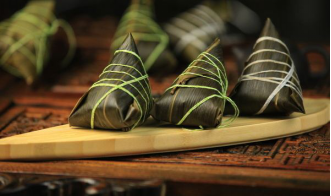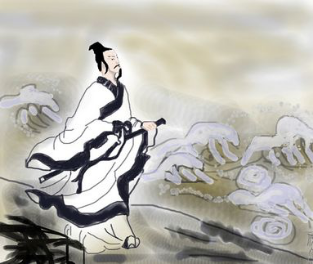


【编者按】正值端午小长假,在中国的外国朋友们会怎样度过这样一个中国传统节日?他们对端午习俗有怎样的看法?东方网英文版收到几位老外的来稿,他们亲笔写下了自己对于端午节的感受。我们来听听犹太人Raphael Genis的故事。或许你与端午节的距离,也就只差一只蔬菜馅的粽子!
Why did you come to China? Many Chinese people I meet often ask me.
“Because Chinese culture and history fascinates me. I am curious about everything related to China, from its rich history of dynasties, variants of food, different traditions and customs which are practiced by different people, within different way, within the same country - China.”
What I like the most about China is its different festivals, which always combine with its two core pillars: special food and folk story.
And this brings me to the zongzi, the unique food eating during Duanwu Festival (Dragon Boat Festival) which falls on the fifth month of the Chinese lunar calendar.
I remember in 2011, when I just arrived to China, celebrating my first year in Shanghai, it was in the afternoon, when my Chinese friend brought me a variety of zongzi to taste and eat.

“It’s our traditional zongzi, a food eaten during this festival to commemorate the death of Qu Yuan, a famous Chinese poet.” “Who was Qu Yuan?” I asked curiously.
“Qu Yuan was one of China’s first poets, a very patriotic person who dedicated his life for his country, something which is evident by all the poems he wrote,” my friend said, while showing me an image of him found in Baidu.

“Actually he was quite an avant-garde person with many new cultural ideas which were quite often oppressed by other rich and powerful people within the country who opposed him, and thereupon he was also exiled by King Huai,” he continued.
“So how did he eventually die?” I asked. “It was when the state of Qin invaded his country, on the 5th day of 5th lunar month, just after finishing his last poet ‘Huai Sha’ he decided to commit suicide, jumping into the Miluo River.” “And the zongzi? How are they related?” I asked, trying to better connect the dots of the story.
“The local people used it to throw into the river trying to keep the fishes away from eating his body. And this is why today we should eat zongzi, to commemorate Qu Yuan”, my friend smiled.
“So what’s the best out of those you brought? Which one is the one I should try to eat first?” I asked. “The one with the pork inside,” my friend said and smiled. “But you know I am Jewish so I don’t eat pork,” I answered.
“Yes I know. This is why I tell you,” he laughed. “But seriously the pork zongzi is the best one, but if you can’t eat so just eat the red bean paste one here.” “Is it sweet?” I asked. “Yes it is, quite sweet.” “So you need to recommend another one, because I don’t like sweet as well,” I smiled.
“So what do you like? The pork one and the sweet one are the best.” “Is there nothing else without pork or not sweet?” I asked, hoping he brought something else, so I could finally try it.
“So you can eat this one, vegetables or mushroom, but I tell you it’s not that tasty, personally I don’t like it,” he smiled with an awkward facial expression.

“Wow!!!This is quite delicious!!” I said instinctively, while biting through the vegetables-filled zongzi. “But there is no taste, no feeling in eating it, do you really like it?” he asked, having it hard to believe. “I really like it!!” I smiled, while finished it and taking another one.
And thanks to the story of Qu Yuan, I was able to enjoy even more the taste of those zongzi: not just because of the inner taste, but rather more because of the inner meaning attached to story behind it.
And thanks to the story of Qu Yuan, I was able to enjoy even more the taste of those zongzi: not just because of the inner taste, but rather more because of the inner meaning attached to story behind it.
And this is how my “love story” with Chinese Dragon Boat Festival began; A “love story” in which each year we meet again, eating those delicious vegetables filled zongzi, while not forgetting to think about my friend’s facial expression.
About the Author:
· Raphael Genis (Rafa) is a German-Israeli Jew living in Shenzhen, China
· A Special TEDx HK & TEDx Hangzhou speaker
· Founder & CEO of “Alef-RAFA " Jewish Parenting Education
· Founder of “Try To Fail” (TTF), a Non-for-Profit organization
· The author of “Distinctive Jewish mindset” book;
· Specialised in Jewish mindset and wisdom
· Guest columnist for China International Radio ( CRI ), Xinhua Media and Oriental Magazine
“你为什么来中国?”我身边的中国朋友经常会问我这样的问题。
我的回答是:“因为我痴迷于中国的历史和文化。对于中国的一切,我都感兴趣,不论是悠久深厚的历史,丰富多样的食物,还是不同民族风情各异的传统习俗,一个国家有着如此多的不同,这就是中国。”
我最喜欢中国的地方就是:这里有各种各样的节日。说到节日,当然少不了节令食品和民间故事。此时我脑海中立即浮现出了粽子的身影,粽子是端午节(农历五月的一个节日,也叫“龙舟节”)的特定食物。
我还记得,2011年我刚来到中国,也就是我来上海的第一年,一天下午,我的一位中国朋友带了一堆各种口味的粽子来给我品尝。这位朋友告诉我:“这是粽子,端午节的传统食物,吃粽子是为了纪念古代爱国诗人屈原。”“屈原是谁?”我好奇地问他。
“屈原是中国历史上最早的诗人,一位甘愿为国家牺牲的爱国志士。他把自己的爱国情怀都寄托在了诗歌中。”朋友一边向我解释,一边还给我百度了一张屈原的图片。他接着又说道:“事实上,屈原的思想主张还是很前卫的,他提出了许多新的文化思想,却遭到权贵们的极力反对,这也是他后来被楚怀王放逐的原因。”
“那他为何而死?”
“后来,秦国大举入侵楚国,那一年的五月初五,屈原写下绝笔之作《怀沙》后,跳入汨罗江自杀而死。”
“可是,这和粽子又有什么关系呢?”我很想知道其中的关联。
“当地的人们为了屈原尸体免受鱼鳖啃食,就往江里扔粽子。这就是我们现在要吃粽子的原因:为了纪念屈原。”
“那你带给我这么多粽子,哪种最好吃呢?我应该先尝试哪一种?”我问道。朋友笑着说:“那就猪肉馅的吧。”
“可你知道的,作为一名犹太人,我不吃猪肉。”我回答他。
“所以我才这么跟你说。”他笑着回答我。“不过,说真的,猪肉馅的最好吃了。如果你实在不能吃,那就吃这个豆沙馅的吧。”
“是甜的吗?”我问他。
“对,很甜。”
“那你还是推荐另一款口味的吧,我也不喜欢吃甜的。”
“那你究竟喜欢什么馅的?猪肉馅和豆沙馅是最好吃的两种了。”
“有没有不是猪肉或豆沙馅的?”真希望还有别的口味,不然就没法尝到粽子了。
“还有就是蔬菜馅或者蘑菇馅的。但我可得提醒你,不是特别好吃哦。我个人不太喜欢。”说到这里,他露出了尴尬而不失礼貌的微笑。 我咬了一口蔬菜馅的粽子,情不自禁地感叹道:“哇,这太好吃了!”朋友很惊讶:“可是那根本没味道啊,吃起来没感觉,你真的喜欢?”
“嗯,真心喜欢!”我开心地把粽子吞了下去,接着又吃了一个。而屈原的故事,也让我感受到了这些粽子的与众不同:除了馅料本身的味道,还有粽子背后蕴含的特殊意义。
这就是我如何爱上端午节的故事,每年我都会过端午,吃蔬菜馅的粽子,脑中还浮现着朋友那尴尬而不失礼貌的微笑。
作者介绍
本文作者 Raphael Genis(中文名:蓝龙)是一名以色列混德国血统的犹太人,现居住于中国深圳。他是TEDx香港& TEDx 杭州特邀演讲嘉宾、 Alef-RAFA阿拉法犹太家庭教育创始人兼首席执行官、Try To Fail《TTF》“尝试失败”公益组织发起人,《 “犹”趣的思维》畅销书作家,擅长分析犹太人思维和智慧。担任中国国际广播电台、新华社、瞭望东方周刊专栏特邀作者。